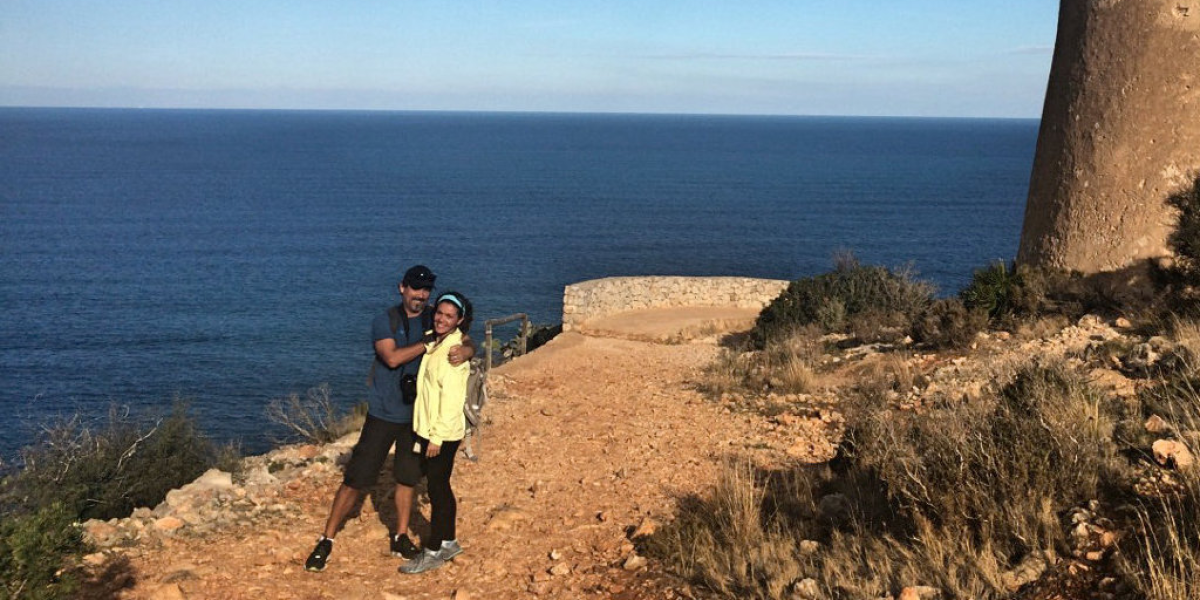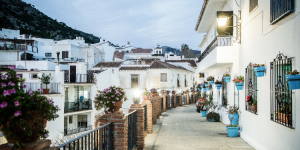
Having visited the country before they met each other, American couple and business-owners Amalia and Eric decided to move to Spain together, thanks to a shared love of the culture, the cuisine and an ancestral connection to the country. They speak to Expat.com about their love of all things Spanish and how they've come to adapt to life in the idyllic town of Dénia.
Where are you from, why Spain, and what were you doing before you arrived?
We're Amalia Maloney Del Riego and Eric J. Trujillo and we're both from the US. Amalia was born in Pennsylvania and grew up in Central Florida. Eric was born and raised in Colorado and lived there until we moved to Spain. We were living in downtown Denver working together on our online marketing business. Eric specializes in branding and design, and Amalia creates the websites and is a writer.
What brought you to Denia?
We first lived in Valencia's historic center (Barrio del Carmen), thinking that we'd always be city-people. We still love the city, but came to find that we wanted to live right on the beach, and we weren't crazy about the beaches in Valencia and wanted a historic center too. We also wanted to live in a town that had a castle on the sea. In Denia we found all that, it's also close to Valencia and has two newer marinas because we also love sailing on the Mediterranean. We have been in Spain almost two years now.
What process did you go through to move to Spain?
Amalia has both the US and Spain nationalities due to the 'Ley de la Memoria Historica' or 'the Law of Historical Memory'. Descendants of Spaniards exiled during the Spanish Civil War could receive Spanish nationality today, and her grandfather was exiled to the Dominican Republic. She plans to write about this in the coming years.
For us, that's kind of how the process started, because it made it possible for us to then make our move to Spain rather quickly. We both had visited Spain on our own before we met, but it was after our first visit together that we decided, let's not put this off and four months later we packed up, sold stuff and moved to Spain.
What is your favourite thing about Spain, and what is your least favourite thing?
Our favorite thing about Spain is the culture, including the gastronomy, history and customs. Our least favorite thing is how many people smoke outside and how acceptable it is even to litter cigarette butts on a beach or the street.
How would you describe Spain in one sentence?
Spain is an enchanting, ancient place that we feel is connected to us through our family history.

What has surprised you the most about Spain?
How inexpensive it is to live here and yet maintain such a high, healthy quality of life.
How easy or difficult it is to find accommodation in Spain?
In rural parts, it may be hard to find accommodation, but, for the most part, we've experienced that it's quite easy to find short and long term rentals and we've had all good experiences with our landlords and real estate agents.
What are the year's biggest holidays in Spain?
In our area it's the Fallas Festivals that happen every March. Throughout all of Spain, we'd say it's Semana Santa (Easter Week) and Three Kings Day.
How do you find the lifestyle in Spain?
Relaxed and very welcoming — people seem very present. It's very family oriented and all about enjoying life, yet not in a crazy way — Spaniards aren't heavy drinkers. The lifestyle is casual, yet also very classy and refined in a natural kind of way.
How is the transportation system in Spain? How do you move around?
Around the larger cities it's very good, with trains, metro and bus lines. Further out into rural areas it can take longer to get around and schedules can be unpredictable sometimes, but overall we like the transportation systems, especially trains. We use bus, taxi and train a lot since we have chosen to not have a car for a while. We tend to cycle or walk into town. It feels healthy and less stressful. We love it!
Have you been able to adapt to Spain and the society?
Oh yes! We have a lot of Spanish friends along with international friends and, even though our Spanish is not great, we have a wonderful time and find that our dealings with townhalls and government processes have gone just fine too. We feel very much at home.

How is everyday life for you in Denia?
Easy going and not busy. We determine our schedules, personally and for work, mainly because we work for ourselves. We work with a view of the sea and go to the open air produce market every Friday. We enjoy eating out, but also love cooking at home. We go to bed a little later, around midnight or so, and wake up around 8:00 or 8:30 (sometimes a little later) without an alarm clock (no alarm clocks anymore for us!). Those times for going to bed and waking up are pretty Spanish. We have coffee first thing in the morning and take our time, eat breakfast mid-morning followed by a large meal for lunch and a light dinner, but not quite as late as Spaniards do. Eric also goes running almost every day, and I try to go for a walk every day.
What new habits have you developed and what old habits have you quit while in Spain?
If it storms really bad or we're gone for more than a few days traveling, we'll close the roll-down shutters on the house windows — we used to never like closing those because at first they seem so claustrophobic and make it so dark in the house. The habit we've quit is filling our time with a bunch of ‘stuff' to do just to be busy, thinking it's productive. We feel we have more of a sense here that less is more when it comes to how much we try to do.
What is your opinion on the cost of living in Spain? How much does a bus ticket, a beer, and a loaf of bread cost?
The cost of living is very low in Spain. A bus ticket for a two-hour ride to a major nearby city is maybe around €12, a good beer on tap is €2 - 3 (or even cheaper in more rural areas), and a loaf of bread costs maybe between 60 cents - €1.50. Our favorite — a bottle of decent, red table wine from here in Spain is only €2 . We feel like we're splurging and it's a special treat for ourselves to spend €5 or more on a bottle of wine.
What is something that you would like to do in Spain, but haven't had the opportunity to do yet?
Stay in a Parador, one of the very medieval, historic ones. These are the castle hotels throughout the country that are part of the Parador system now.
What is your most memorable experience in Spain?
There's not just one! Our most recent memorable experience was spontaneously going sailing along the Costa Blanca here from Denia, this past Saturday. Our expat friends from Scotland have a beautiful sailboat and took us out for the day. Another very memorable experience was from a couple of years ago when we visited the village of Trujillo in Extremadura. We had planned to just stop quickly, but when we saw the plaza we decided to stay the night in a great hostal room right in the main plaza and saw the castle the next day. The town was special to us because Eric's descendants came from that region to Mexico.

If you could re-do the move to Spain, what would you do differently?
We would have gotten our Domestic Partnership processed in Colorado instead of in Spain, because it's cheaper and easier in Colorado. It is possible to get a Domestic Partnership relatively easily in Spain if one of the people has Spanish nationality like Amalia does. The processes and criteria do vary though, depending on the region of Spain you're living in or empadronado (registered) in.
What do you think of the local cuisine? What are your favourite dishes?
We love the Spanish food and how it varies according to region. The town where we live was designated by UNESCO as a Creative City of Gastronomy in 2015, and they're known as having more restaurants than you can visit in one year (if you tried one each day). The food is local, fresh, healthy, and creative. Some of our favorite dishes are Arroz al horno, paella, cocas, as well as their fish and seafood. Amalia's favorite ‘tapa', croquetas caseras (homemade) de jamon, or gambanitas, or setas they're all good!
Give us some useful tips that soon-to-expatriates in Spain will benefit from.
Get to know the locals and go out of your way to have Spanish friends, not just fellow expats. There's usually great intercambio (exchange) groups in towns that connect you with the local people and culture.
If you had to advise an expat on five items to bring with them in Spain, which would you choose?
Flip flops for sunny, warm, summer days, a carry-on size suitcase that is easy to take on a bus and train, a decent translator app on your phone, quick-dry clothes and a quick-dry towel because it's still more typical to not have a dryer in your home, a good coin purse or wallet for change.
What are your plans for the future?
Denia will remain our home-base and we plan to travel around Spain (Galicia, Cantabria, Basque Country and certain cities like Granada, Segovia, and Salamanca) writing stories about the experiences and creating travel videos of it, for our site MoveToTraveling.com. We do have a road trip through Extremadura planned very soon for Easter-week this April. After this year, our desire is to do more trips to other parts of Europe and perhaps a month or two somewhere in Asia, but when we return ‘home' it will be to Denia, Spain.
What is one thing that you will take with you from Spain?
Spain is always with us...I guess we have with us our feeling of connection and family history with Spain and our love of the Mediterranean.



















